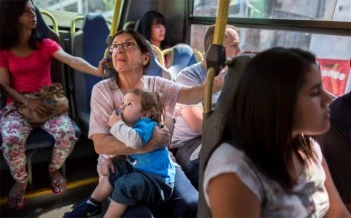When Maria Lucia Martins Moreira retired two years ago as a school canteen assistant in the Brazilian city of Sao Paolo, life changed direction, but hardly altered pace. She remained busy caring for her husband and two of her three grandchildren. Then unexpectedly, Maria was dismayed to find her eyesight deteriorating rapidly. After seeking a diagnosis her eye specialist delivered the bad news: she had cataracts.

“It is frightening to lose your ability to see,” said Maria, speaking at her small home in a densely populated area of Sao Paolo. “I lost the sharpness and clarity I’d been used to and then my vision became cloudy. Eventually I could only see the outline of shapes, even with my glasses on. I lost the vision I needed to function normally.”
Cataracts are a serious but common eye condition, most often related to age. They affect more than 20 million people worldwide, according to the World Health Organization. Clumps of proteins in the eye cause a clouding of the normally transparent lens. Although cataracts can be surgically removed, patients in many countries lack access to this treatment and can suffer a severe loss of vision. Cataracts are responsible for more than half of all new cases of blindness around the world, the WHO estimates. As people age, more suffer cataracts and the treatment burden on society will increase.
Cataracts can be surgically removed but patients in many countries lack access to this treatment and can suffer a severe loss of vision. Cataracts are responsible for more than half of all new cases of blindness around the world, according to the World Health Organization.
As Maria found daily activities like reading and cooking impossible without help, the financial implications hit home. Her daughters relied on her to help with child-care so they could hold down their own jobs. And Maria, used to supplementing her own pension with money earned by sewing, began to worry about making ends meet.
Months ago, Maria decided she wanted surgery but she knew it would be costly. Fortunately, she secured a place on the surgical list of a leading Sao Paolo eye surgeon thanks to a community outreach program aimed at widening public access to eye care in the city. Maria headed for the eye surgery clinic, run by university professor Dr. Walton Nosé, with access to a wide range of advanced ophthalmology equipment.
Cataract surgery itself is a relatively standard procedure and patients recover quickly. During the operation, which takes less than 30 minutes under local anesthesia, the surgeon removes the affected lens and replaces it with a small plastic lens called an intraocular implant.
Maria’s hopes for the surgery were simple: to restore enough eyesight for her to live independently again and to be able to look after her grandchildren and enjoy the quality of vision that well-sighted people take for granted.
Her eye surgeries took place on consecutive days. Conscious throughout, Maria said the procedure was straightforward. As a nurse removed the last bandage, she asked to see her grandchildren. And so, armed with eye drops in hand and plastic glasses to protect her eyes from dust and other irritants, Maria went home.
“Few sights are as precious as the faces of your grandchildren,” said Maria, beaming. “Seeing them again clearly was like looking at the faces of angels, a revelation. I am getting back to normal very quickly. I feel blessed.”



